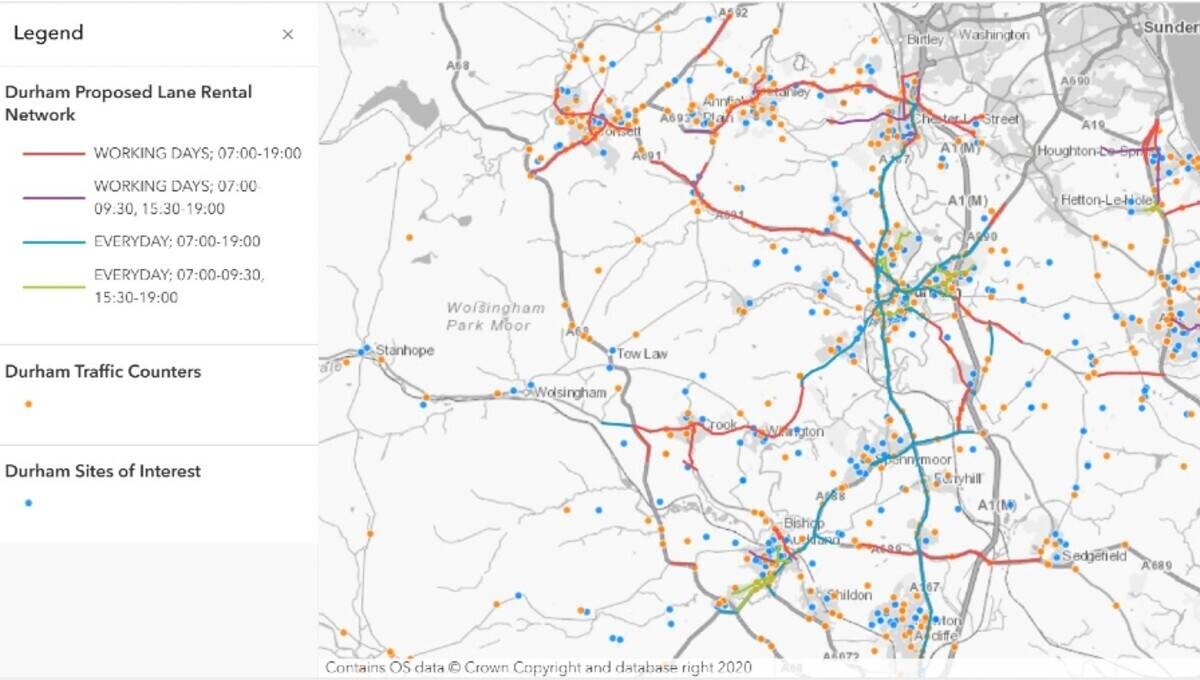Sedgefield Borough Council is achieving significant savings and improving the services it delivers to its citizens through the use of the National Land and Property Gazetteer (NLPG).
Used as a centralised address database, the NLPG data forms a vital link between the Council's Customer Relationship Management system (CRM) and essential back office information management tools, such as those used for waste and recycling. The CRM is a countywide partnership that provides Customer Contact staff in each of the seven districts with instant access to live service information ensuring they can answer queries from residents more effectively and efficiently. It is estimated that these improvements are saving Sedgefield Council alone several thousand pounds per annum on the provision of waste services to residents.
Sedgefield Borough Council is situated in the south of County Durham in the north east of England. Home to 87,000 residents, including the former Prime Minister Tony Blair, the Council is responsible for the weekly collection of waste from approximately 43,000 domestic properties and also offers a special collection service, fortnightly recycling and green waste collections. Understanding the importance of the local environment to its residents and the impact of refuse and recycling on the environment, Sedgefield Borough Council decided to deliver a pro-active, rather than re-active, service.
"The residents of the Borough are the Council's priority," said Lyn Smith, GIS Officer and custodian of the Council's LLPG data. "And we know that collection of domestic waste is one of the most visible services we offer and is therefore a major concern for many people," she continued. "The decision was therefore made to improve the service we offer as well as improving access to information about the service." Unique Property Reference Numbers (UPRN), part of the NLPG data, were used to match addresses from the Council's CRM with those used for waste collection. This ensured consistency of data between the two systems and as every property had a unique and standardised address, duplicates, errors and incomplete records were virtually eliminated. The dynamic link gives Customer Service staff instant access to information held within the back office system from a CRM interface and has also facilitated the sharing of property related information via the Council's public access website "Sedgefield Information Services (SIS)". In addition Street Scene staff, responsible for waste collection, have up to date and accurate property records with which to manage the service.
"By making information about the service instantly accessible to staff we can answer queries and service requests from residents more easily. With more than 3,000 requests per month the efficiency gain of 30 seconds per request that we have achieved through the use of the NLPG data equates to a projected saving of £3,000 per annum," said Lyn. "This saving is increased by a further £5,000 by automating the monitoring and management of Special Collections within the CRM workflow."
12 July 2007
Notes to Editors:
The NLPG was initiated in 1999 to become the master address dataset for England and Wales and the central hub for the 376 address creating Local Authorities and their Local Land and Property Gazetteers (LLPGs). Based on unique property reference numbers (UPRNs) the underlying principle of these gazetteers is to provide a single definitive address database for all departments and systems across a local authority in order to cut costs, improve efficiency and service delivery.
The dataset enables various local authority departments - from revenue collection and environmental health, to social security, the electoral roll and education - to now offer true âjoined up' government. The benefits also go beyond service delivery. Fraud prevention, tax collection and disaster planning all benefit from the fact that each property is given a âUnique Property Reference Number' which transcends (property) numbers, names, descriptions (such as âThe Nursing Home') and postcodes. UPRNs are assigned for the full life of the plot and/or building.
The project was given a significant boost in 2005 with the introduction of the Mapping Services Agreement, which committed all Local Authorities to bringing their gazetteers up to standard and to start submitting regular updates to the NLPG hub for use by national and regional organisations. Collaboration with DNA-S (Definitive National Addressing for Scotland) who use the same BS7666 processes and database schemas means that the a British addressing infrastructure is now a reality.
Intelligent Addressing is a specialist private sector consultancy (an SME) employing recognised experts in addressing. It was originally set up to help develop the National Land and Property Gazetteer (NLPG) on behalf of local government and now manages the NLPG and NSG central data hubs under the terms of the Mapping Services Agreement (MSA) with local government.
Intelligent Addressing Contact:
Gayle Gander, Head of Marketing | Tel: 020 7747 3500 | Email: [email protected] | www.nlpg.org.uk
Editorial enquiries and colour separation requests:
William Allbrook T: 01666 826641 | F: 01666 824668
The Improvement and Development Agency (IDeA) The IDeA works in partnership with all councils, to enhance the performance of the best, accelerate the speed of improvement of the rest, and develop the sector as a whole. IDeA has brokered the Mapping Services Agreement (MSA) with Intelligent Addressing to develop the NLPG and NSG, through the Local Government Information House (LGIH), a wholly owned subsidiary of the Agency.
Working in partnership with the local government community developing national infrastructure projects that enable councils to deliver local services more effectively, LGIH acts as an intermediary between the public and the private sector enabling it to negotiate with private companies on behalf of local authorities in order to provide key parts of a technical infrastructure for improved service delivery.
The NLPG is a joint venture between the Information House and Intelligent Addressing Limited.
IDeA contacts:
Steve Brandwood, Programme Manager | T: 020 7296 6615 | E: [email protected]
Media: Paul Bailey | 020 7296 6529
Sedgefield Borough Council is situated in the south of County Durham in the north east of England. Home to 87,000 residents, including the former Prime Minister Tony Blair, the Council is responsible for the weekly collection of waste from approximately 43,000 domestic properties and also offers a special collection service, fortnightly recycling and green waste collections. Understanding the importance of the local environment to its residents and the impact of refuse and recycling on the environment, Sedgefield Borough Council decided to deliver a pro-active, rather than re-active, service.
"The residents of the Borough are the Council's priority," said Lyn Smith, GIS Officer and custodian of the Council's LLPG data. "And we know that collection of domestic waste is one of the most visible services we offer and is therefore a major concern for many people," she continued. "The decision was therefore made to improve the service we offer as well as improving access to information about the service." Unique Property Reference Numbers (UPRN), part of the NLPG data, were used to match addresses from the Council's CRM with those used for waste collection. This ensured consistency of data between the two systems and as every property had a unique and standardised address, duplicates, errors and incomplete records were virtually eliminated. The dynamic link gives Customer Service staff instant access to information held within the back office system from a CRM interface and has also facilitated the sharing of property related information via the Council's public access website "Sedgefield Information Services (SIS)". In addition Street Scene staff, responsible for waste collection, have up to date and accurate property records with which to manage the service.
"By making information about the service instantly accessible to staff we can answer queries and service requests from residents more easily. With more than 3,000 requests per month the efficiency gain of 30 seconds per request that we have achieved through the use of the NLPG data equates to a projected saving of £3,000 per annum," said Lyn. "This saving is increased by a further £5,000 by automating the monitoring and management of Special Collections within the CRM workflow."
12 July 2007
Notes to Editors:
The NLPG was initiated in 1999 to become the master address dataset for England and Wales and the central hub for the 376 address creating Local Authorities and their Local Land and Property Gazetteers (LLPGs). Based on unique property reference numbers (UPRNs) the underlying principle of these gazetteers is to provide a single definitive address database for all departments and systems across a local authority in order to cut costs, improve efficiency and service delivery.
The dataset enables various local authority departments - from revenue collection and environmental health, to social security, the electoral roll and education - to now offer true âjoined up' government. The benefits also go beyond service delivery. Fraud prevention, tax collection and disaster planning all benefit from the fact that each property is given a âUnique Property Reference Number' which transcends (property) numbers, names, descriptions (such as âThe Nursing Home') and postcodes. UPRNs are assigned for the full life of the plot and/or building.
The project was given a significant boost in 2005 with the introduction of the Mapping Services Agreement, which committed all Local Authorities to bringing their gazetteers up to standard and to start submitting regular updates to the NLPG hub for use by national and regional organisations. Collaboration with DNA-S (Definitive National Addressing for Scotland) who use the same BS7666 processes and database schemas means that the a British addressing infrastructure is now a reality.
Intelligent Addressing is a specialist private sector consultancy (an SME) employing recognised experts in addressing. It was originally set up to help develop the National Land and Property Gazetteer (NLPG) on behalf of local government and now manages the NLPG and NSG central data hubs under the terms of the Mapping Services Agreement (MSA) with local government.
Intelligent Addressing Contact:
Gayle Gander, Head of Marketing | Tel: 020 7747 3500 | Email: [email protected] | www.nlpg.org.uk
Editorial enquiries and colour separation requests:
William Allbrook T: 01666 826641 | F: 01666 824668
The Improvement and Development Agency (IDeA) The IDeA works in partnership with all councils, to enhance the performance of the best, accelerate the speed of improvement of the rest, and develop the sector as a whole. IDeA has brokered the Mapping Services Agreement (MSA) with Intelligent Addressing to develop the NLPG and NSG, through the Local Government Information House (LGIH), a wholly owned subsidiary of the Agency.
Working in partnership with the local government community developing national infrastructure projects that enable councils to deliver local services more effectively, LGIH acts as an intermediary between the public and the private sector enabling it to negotiate with private companies on behalf of local authorities in order to provide key parts of a technical infrastructure for improved service delivery.
The NLPG is a joint venture between the Information House and Intelligent Addressing Limited.
IDeA contacts:
Steve Brandwood, Programme Manager | T: 020 7296 6615 | E: [email protected]
Media: Paul Bailey | 020 7296 6529



